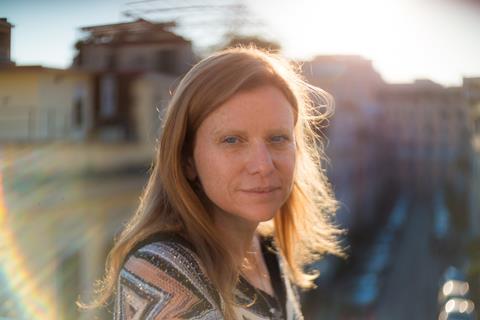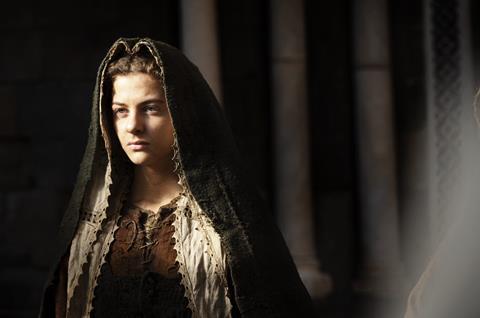
Susanna Nicchiarelli’s fifth narrative feature Chiara, which premieres today (September 9) in Venice competition, is her third film in a row focusing on real-life women who struggled to live the life they wanted to.
It follows in the wake of 2017’s Nico, 1988, focused on the life of pop singer Nico, and 2020’s Miss Marx, which trained its lens on Karl Marx’s youngest daughter Eleanor.
The Italian filmmaker wouldn’t call Chiara part of a trilogy, however, and never set out to make one, even when she heard about the story of Saint Clare of Assisi and decided to make a film about her: “My producers told me another [biographical film] was fine,” she tells Screen in advance of the film’s premiere.
Chiara chronicles a few crucial years in the life of Saint Clare, a 13th-century Italian noblewoman who left her wealthy family to become an early follower of Francis of Assisi, founding a monastic religious order for women called the Order of the Poor Ladies (rechristened after her death as the Order of Saint Clare).
In the leading role is My Brilliant Friend’s Margherita Mazzucco while Francis of Assisi is played by Andrea Carpenzano (Boys Cry). Chiara is produced by Marta Donzelli’s Vivo Film, which also produced Miss Marx and Nico, 1988.
Together with Alice Rohrwacher and Laura Bispuri, Nicchiarelli has become one of the most prominent Italian female filmmakers working today. Unlike them, however, she has a strong bond with Venice: four of her five features have premiered at the festival, with Chiara following Miss Marx as her second film competing for the Golden Lion.
Chiara is represented by The Match Factory for international sales.
Nico, Eleonor Marx and Saint Clare: do these three women have anything in common?

I think they just want to be what they want to be. Nico wants to write her songs, Eleonor Marx wants to fight [alongside] the workers and Chiara just wants to be a Franciscan but not a nun. She wants to be poor, evangelise, put up a community of women… What I love about this film, compared to the others, is that it’s the positive one, because she’s not alone in the end, and in this there’s a sort of answer that works. She accepts several compromises but in the end gets something. You’ve got to imagine that on the political side the idea [that] Saint Francis [was proposing] was anarchy: no leaders. Turning that into an order, and giving it a structure and hierarchy, was the compromise necessary to continue existing.
International territory sales is what allows directors like yourself to keep making films. Does the post-pandemic drop in admissions we’re still seeing in many countries impact you?
Yes, because box office and a theatrical run is what gets you out of anonymity. In an on-demand catalogue, you’re a drop in the ocean; being [on a platform] is not enough. And producing just for TV equals disappearing; it’s festivals and theatres that create the event. I don’t have big budgets, my movies are produced through Eurimages, co-productions and public funds. Chiara’s cost was approximately €5m – a good budget for European standards but not that much for a medieval-set picture.
Have you seen the gender imbalance in the Italian industry change in these recent years?
It seems things are getting better. I see more women making movies but what breaks my heart is that still too few women apply to study cinema and become a director. Working at the admissions for the Centro Sperimentale [Italy’s national school of cinema, where Nicchiarelli teaches and also evaluates applicants], still less than one third of total applications come from women. We need to work on the visibility of women directors, people have to see that it’s a possibility.
A few years ago, when there was a lot of discussion about Venice having too few women directors in competition, you argued in favour of Alberto Barbera’s stance against imposing quotas. Do you still stand by that?
Yes, we don’t need quotas in the selection, but in the selection committees and in the juries, as is the case here in Venice. What we need is the female gaze on films, not a world of men judging. But no quotas in the selection please. I like to think I was selected because my film is good, not because I’m a woman. I like to think I was admitted to the Centro Sperimentale because I was talented, not because I’m a woman.















![[L-R]: Amanda Villavieja, Laia Casanovas, Yasmina Praderas](https://d1nslcd7m2225b.cloudfront.net/Pictures/274x183/6/4/1/1471641_pxl_20251224_103354743_618426_crop.jpg)







![[L-R]: Amanda Villavieja, Laia Casanovas, Yasmina Praderas](https://d1nslcd7m2225b.cloudfront.net/Pictures/100x67/6/4/1/1471641_pxl_20251224_103354743_618426_crop.jpg)

No comments yet